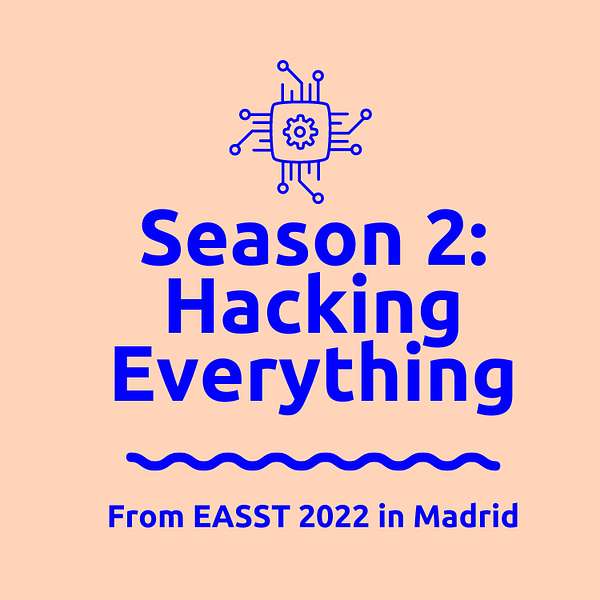
Hacker Cultures: The Conference Podcast
As Covid-19 turned most conferences virtual, so to combat Zoom-fatigue, at 4S/EASST 2020 we decided to try another format and turn a conference session into a podcast. Among hundreds of panels, papers and sessions, our panels rounded up all sorts of researchers who study what it is to be a hacker, and what hacking, programming, tinkering and working with computers is all about. We have continued biennally for full three seasons.
The newest season comes to you from the 2024 join Society for Social Studies of Science/European Association for the Study of Science and Technology conference (4S/EASST) in Amsterdam, titled "Making and Doing Transformations".
The second series was from EASST 2022 titled "The Politics of Technoscientific Futures" held in Madrid in July 2022. Our panel was titled "Hacking Everything. The cultures and politics of hackers and software workers". The first series was from 4S/EASST in "virtual Prague" in August 2020, titled "Locating and Timing Matters: Significance and agency of STS in emerging worlds".
We the hosts are Paula Bialski, who is an Associate Professor at the University of St. Gallen, Andreas Bischof who is a Research Group Leader at Chemnitz University of Technology, and Mace Ojala, a PhD scholar at Ruhr-University Bochum. Audio production by Heights Beats at Hotmilk Records. The theme track of first series is "Rocky" by Paula & Karol. Heights Beats produced the theme track of the second series. Funding for the editing of this first series comes from University of St. Gallen, the second from Chemnitz University of Technology.
Hacker Cultures: The Conference Podcast
Episode 7 (2022) Ola Michalec - Engineer-as-a-service. What is the future of engineering professionals in the digital world?
We have the pleasure to chat with Ola Michalec, a Senior Research Associate at University of Bristol. Don't miss on our discussion with Ola in 2020.
For decades, nuclear plants, power stations, or wastewater facilities were safe from the hype of digital innovations. These industries have traditionally been operated by industrial control systems fairly simple computers using binary logics to enable the movement and sensing of engineering machinery. Such technologies were disconnected from the internet and operated on-site by manual workers. With the advent of the Fourth Industrial Revolution (Schilin, 2020) engineering processes are about to gain sophisticated computing capabilities, from remote control enabled by the cloud or predictive maintenance thanks to ML algorithms. Moreover, industry experts (Cisco, 2018) have already announced that modern computing is blending with legacy engineering technologies. But who is doing the blending and revolutionising? Drawing from the approaches in STS and Computer-Supported-Cooperative Work (Slayton and Clark-Ginsberg, 2018; Jenkins et al., 2020), our research looks at the collaborative practices between engineers and software workers (Michalec et al., 2020; Michalec et al, 2021). Based on the case study of the implementation of cyber security regulations in critical infrastructures, we investigate how practitioners navigate tensions between the priorities of modern computing (security, connectivity, innovations, interoperability) and traditional engineering (safety, reliability, availability). Ultimately, we argue that digital innovations entering the world of critical infrastructures will reconfigure the responsibilities and training needs for engineers to come. This, in turn, creates novel ethical and political considerations for the profession, which should inform the future STS research agenda.
This episode is a live recording from Hacking Everything. The Cultures and Politics of Hackers and Software Workers panel organized at the European Association for the study of Science and Technology (EASST) 2022 conference in Madrid on 2022-07-07. The hosts are Paula Bialski, Andreas Bischof and Mace Ojala. Audio production by Heights Beats at Hotmilk Records, who also produced the theme track. We are grateful for Chemnitz University of Technology for funding.